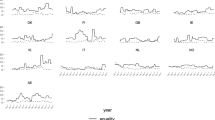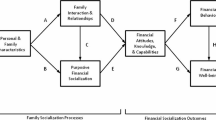Abstract
For both the U.S. and Poland, we develop measurement models of the family's social-stratification position and of parents' and children's valuations of self-direction. We find that the relationship between parents' and children's values is much stronger than past studies had indicated. In both countries the family's stratification position has an impressive bearing on the values of its adolescent and young-adult offspring. Much of this impact is through social stratification affecting parents' values, and parents' values, in turn, affecting children's values. Social stratification affects parental values primarily because of the impact of parents' occupational self-direction on their values. Although parents' and children's values may be reciprocally related, the predominant effects are from parents' to children's values. The one notable cross-national difference we find is in the relative roles of fathers and mothers in the intergenerational transmission of values: in the United States, fathers play at least as important a role as do mothers; in Poland, mothers play the predominant role.
Similar content being viewed by others
References
Bell, Richard Q. 1968 “A reinterpretation of the direction of effects in studies of socialization.” Psychological Review 75 (March):81–95.
Bengtson, Vern L. 1975 “Generation and family effects in value socialization.” American Sociological Review 40(June):358–371.
Bengtson, Vern L. andMary Christine Lovejoy 1973 “Values, personality, and social structure: An intergenerational analysis.” American Behavioral Scientist 16(July/August):880–912.
Bonjean, Charles M., Richard J. Hill, andS. Dale McLemore 1967 Sociological Measurement: An Inventory of Scales and Indices. San Francisco: Chandler.
Clausen, John A. 1974 “Value transmission and personality resemblance in two generations.” Paper presented to the annual convention of the American Sociological Association, Montreal.
Clausen, John A., Paul H. Mussen, andJoseph Kuypers 1981 “Involvement, warmth, and parent-child resemblances in three generations.” In Dorothy H. Eichorn, John A. Clausen, Norma Haan, Marjorie P. Honzik, and Paul H. Mussen (eds.), Present and Past in Middle Life:299–319. New York: Academic Press.
Dalton, Russell J. 1982 “The pathways of parental socialization.” American Politics Quarterly 10(April):139–157.
1961 “A socioeconomic index for all occupations,” and “Properties and characteristics of the socioeconomic index.” In Albert J. Reiss et al., Occupations and Social Status:109–161. New York: Free Press.
1967 “Some linear models for two-wave, two-variable panel analysis.” Psychological Bulletin 72(May):177–182.
1975 Introduction to Structural Equation Models. New York: Academic Press.
Furstenberg, Frank F., Jr. 1971 “The transmission of mobility orientation in the family.” Social Forces 49(June):595–603.
Gecas, Viktor 1980 “Father's occupation and child socialization: An examination of the linkage hypothesis.” Paper presented to the annual convention of the American Sociological Association, New York City.
Heise, David R. 1975 Causal Analysis. New York: Wiley.
Hodge, Robert W., Paul M. Siegel, andPeter H. Rossi 1964 “Occupational prestige in the United States, 1925–63.” American Journal of Sociology 70(November):286–302.
Hoge, Dean R., Gregory H. Petrillo, andElla I. Smith 1982 “Transmission of religious and social values from parents to teenage children.” Journal of Marriage and the Family 44(August):569–580.
Jackson, David J. andDuane F. Alwin 1980 “The factor analysis of ipsative measures.” Sociological Methods and Research 9(November):218–238.
Jennings, M. Kent andRichard G. Niemi 1968 “The transmission of political values from parent to child.” The American Political Science Review 62(March):169–184.
Kerckhoff, Alan C. andJudith L. Huff 1974 “Parental influence on educational goals.” Sociometry 37(September):307–327.
1969 Class and Conformity: A Study in Values. Homewood, IL: The Dorsey Press. (Second edition, 1977, published by the University of Chicago Press.)
1976 “Social class and parental values: Another confirmation of the relationship.” American Sociological Review 41(June):538–545.
1983 “On the transmission of values in the family: A preliminary formulation.” In Alan C. Kerckhoff (ed.), Research in Sociology of Education and Socialization, Vol. 4:3–12. Greenwich, CT: JAI Press.
Kohn, Melvin L. and Carrie Schoenbach 1980 “Social stratification and parental values: A multi-national assessment.” Paper presented to the Japan-U.S. Conference on Social Stratification and Mobility, Hawaii, January.
1983 “Class, stratification, and psychological functioning.” In Melvin L. Kohn and Carmi Schooler, Work and Personality: An Inquiry into the Impact of Social Stratification:154–189. Norwood, NJ: Ablex Publishing Corp.
1982 “Job conditions and personality: A longitudinal assessment of their reciprocal effects.” American Journal of Sociology 87(May):1257–1286.
1983 With the collaboration of Joanne Miller, Karen A. Miller, Carrie Schoenbach, and Ronald Schoenberg. Work and Personality: An Inquiry into the Impact of Social Stratification. Norwood, NJ: Ablex.
Looker, E. Dianne andPeter C. Pineo 1983 “Social psychological variables and their relevance to the status attainment of teenagers.” American Journal of Sociology 88(May):1195–1219.
Lueptow, Lloyd B., McKee J. McClendon, andJohn W. McKeon 1979 “Father's occupation and son's personality: Findings and questions for the emerging linkage hypothesis.” The Sociological Quarterly 20(Autumn):463–475.
Markowska, Danuta 1975 Wspolczesna rodzina w Polsce. Warsaw: Ksiazka i Wiedza.
Miller, Joanne, Carmi Schooler, Melvin L. Kohn, andKaren A. Miller 1979 “Women and work: The psychological effects of occupational conditions.” American Journal of Sociology 85(July):66–94.
Miller, Karen A., Melvin L. Kohn, andCarmi Schooler 1985 “Educational self-direction and the cognitive functioning of students.” Social Forces 63(June):923–944.
Morgan, William R., Duane F. Alwin, andLarry J. Griffin 1979 “Social origins, parental values, and the transmission of inequality.” American Journal of Sociology 85 (July):156–166.
Mortimer, Jeylan T. andDonald Kumka 1982 “A further examination of the ‘occupational linkage hypothesis’.” The Sociological Quarterly 23(Winter):3–16.
Niemi, Richard G., R. Danforth Ross, andJoseph Alexander 1978 “The similarity of political values of parents and college-age youths.” Public Opinion Quarterly 42(Winter):503–520.
Nowak, Stefan 1981 “Values and attitudes of the Polish people.” Scientific American 245(July):45–53.
Rosenberg, Morris andLeonard I. Pearlin 1978 “Social class and self-esteem among children and adults.” American Journal of Sociology 84(July):53–77.
Schoenbach, Carrie 1985 “Effects of husband's and wife's social status on psychological functioning.” Journal of Marriage and the Family 47(August):597–607.
Siegel, Paul M. 1971 Prestige in the American Occupational Structure. Unpublished Ph.D. dissertation, University of Chicago.
Skvoretz, John V. andUbol Kheoruenromne 1979 “Some evidence concerning the value hypothesis of intergenerational status transmission: A research note.” Social Science Research 8:172–183.
Slomczynski, Kazimierz M. and Grazyna Kacprowicz 1979 Skale Zawodow. Warsaw. Institute of Philosophy and Sociology of the Polish Academy of Sciences.
Slomczynski, Kazimierz M., Joanne Miller, andMelvin L. Kohn 1981 “Stratification, work, and values: A Polish-United States comparison.” American Sociological Review 46 (December):720–744.
1982 “The case for parental transmission of educational goals: The importance of accurate offspring perceptions.” Journal of Marriage and the Family 44(August):661–674.
1983 “Parental influence: A review of the evidence of influence and a theoretical model of the parental influence process.” In Alan C. Kerckhoff (ed.), Research in Sociology of Education and Socialization, Vol. 4:13–45. Greenwich, CT: JAI Press.
Treiman, Donald J. 1977 Occupational Prestige in Comparative Perspective. New York: Academic Press.
Troll, Lillian andVern Bengtson 1979 “Generations in the family.” In Wesley R. Burr, Reuben Hill, F. Ivan Nye, and Ira L. Reiss (eds.), Contemporary Theories about the Family. Vol. 1, Research-based Theories:127–161. New York: The Free Press.
1968 “The concept of values.” In David L. Sills (ed.), International Encyclopedia of the Social Sciences. Vol. 16:283–287 New York: Macmillan Co. and Free Press
1970 American Society: A Sociological Interpretation, 3d ed. New York: Knopf.
Author information
Authors and Affiliations
Rights and permissions
About this article
Cite this article
Kohn, M.L., Slomczynski, K.M. & Schoenbach, C. Social stratification and the transmission of values in the family: A cross-national assessment. Sociol Forum 1, 73–102 (1986). https://doi.org/10.1007/BF01115074
Issue Date:
DOI: https://doi.org/10.1007/BF01115074




